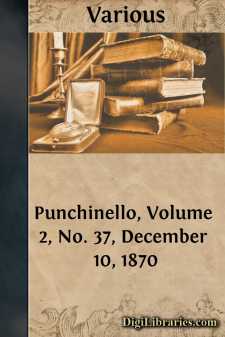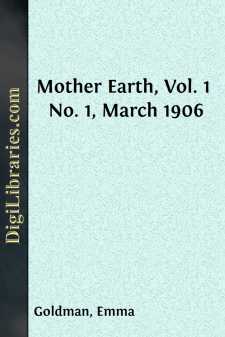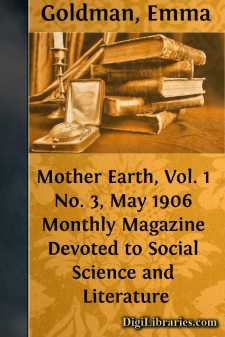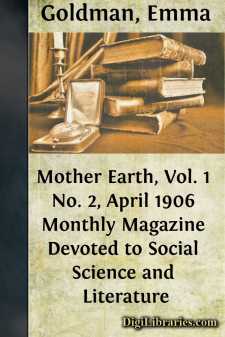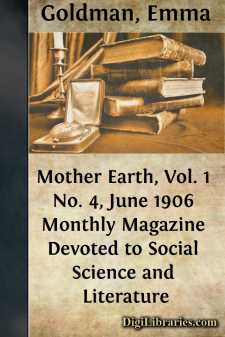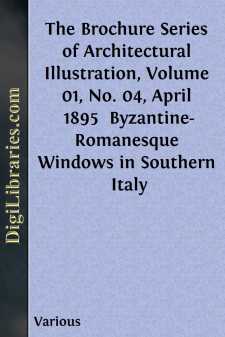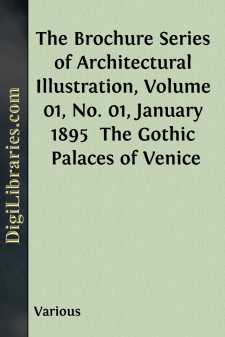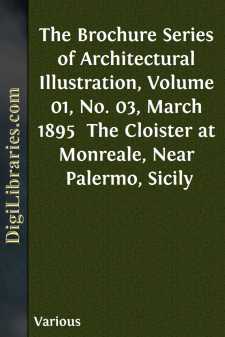Periodicals
- Art 27
- Children's periodicals 59
- Entertainment 5
- Food/Wine 2
- Games/Humor 455
- General 661
- Health 1
- History 53
- House/Home 1
- Regional 62
- Science/Nature 118
- Transportation 10
Periodicals Books
Sort by:
by:
Various
MAN AND WIVES. A TRAVESTY. By MOSE SKINNER. CHAPTER FOURTH. THE HALF-WAY HOUSE he first person to discover that ANN BRUMMET had left the house, was Mrs. LADLE, Now, ever since the Hon. MICHAEL had asked ANN to go to the circus, Mrs. LADLE had hated her. But when he took ANN to the Agricultural Fair, and bought her a tin-type album and a box of initial note-paper, Mrs. LADLE was simply raving. Whether...
more...
by:
Various
MAN AND WIVES. A TRAVESTY. By MOSE SKINNER, CHAPTER SIXTH. ANN'S RECEPTION. The next morning, as ANN was eating breakfast, who should drive up in a covered wagon but the Hon. MICHAEL. "Just as I expected," said she. "They've found out where I am, and they'll come out here and try to pump me about it. But I don't envy 'em their job. Come in," she added, in answer...
more...
by:
Emma Goldman
MOTHER EARTH HERE was a time when men imagined the Earth as the center of the universe. The stars, large and small, they believed were created merely for their delectation. It was their vain conception that a supreme being, weary of solitude, had manufactured a giant toy and put them into possession of it. When, however, the human mind was illumined by the torch-light of science, it came to understand...
more...
by:
Emma Goldman
TIDINGS OF MAY. The month of May is a grinning satire on the mode of living of human beings of the present day. The May sun, with its magic warmth, gives life to so much beauty, so much value. The dead, grayish brown of the forest and woods is transformed into a rich, intoxicating, delicate, fragrant green. Golden sun-rays lure flowers and grass from the soil, and kiss branch and tree into blossom and...
more...
by:
Emma Goldman
OBSERVATIONS AND COMMENTS. Whoever severs himself from Mother Earth and her flowing sources of life goes into exile. A vast part of civilization has ceased to feel the deep relation with our mother. How they hasten and fall over one another, the many thousands of the great cities; how they swallow their food, everlastingly counting the minutes with cold hard faces; how they dwell packed together, close...
more...
by:
Emma Goldman
MRS. GRUNDY. By Viroqua Daniels.Her will is law. She holds despotic sway.Her wont has been to show the narrow wayWherein must tread the world, the bright, the brave,From infancy to dotard's gloomy grave."Obey! Obey!" with sternness she commandsThe high, the low, in great or little lands.She folds us all within her ample gown.A forward act is met with angry frown.The lisping babes are...
more...
by:
Various
BYZANTINE-ROMANESQUE WINDOWS IN SOUTHERN ITALY. The collection of photographs from which the plates in this and the February number were selected was only recently made under the direction of Signor Boni, an official of the Italian government, charged with the care and restoration of historic monuments. The province of Apulia has been so little invaded by the march of modern improvement, and its...
more...
by:
Various
r Wilson Eyre, Jr., in an article in The Architectural Review for January, which has been alluded to in our issue for October, and from which we have borrowed the three charming illustrations reproduced from his drawings, speaks as follows of English domestic architecture: “There is much to be seen from the railroad in the way of long rambling farmhouses and country houses of the modest kind, and...
more...
by:
Various
I. SOUTHWEST ANGLE OF THE DUCAL PALACE, VENICE. Although the Ducal Palace is much larger than the other palaces of Venice, and intended for general civic uses as well as a residence for the Duke or Doge, it follows closely the type already described. It has undergone so many changes since its first foundation in about the year 800 (813 according to Ruskin), having been destroyed five times, and as...
more...
by:
Various
THE CLOISTER AT MONREALE, NEAR PALERMO, SICILY. The island of Sicily, being in form nearly an equilateral triangle, with one side facing towards Italy, another towards Greece, and the third, towards Africa, was a tempting field for conquest to the various nations surrounding it. It was successively overrun by the Greeks, Carthaginians, and Romans, and later, after the Christian era, again successively...
more...


